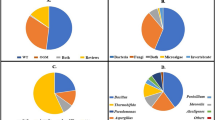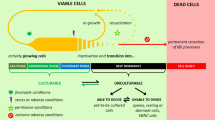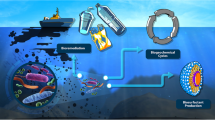Abstract
Objectives
To compare the degradation performance and biodiversity of a polyvinyl alcohol-degrading microbial community under aerobic and anaerobic conditions.
Results
An anaerobic–aerobic bioreactor was operated to degrade polyvinyl alcohol (PVA) in simulated wastewater. The degradation performance of the bioreactor during sludge cultivation and the microbial communities in each reactor were compared. Both anaerobic and aerobic bioreactors demonstrated high chemical oxygen demand removal efficiencies of 87.5 and 83.6 %, respectively. Results of 16S rDNA sequencing indicated that Proteobacteria dominated in both reactors and that the microbial community structures varied significantly under different operating conditions. Both reactors obviously differed in bacterial diversity from the phyla Planctomycetes, Chlamydiae, Bacteroidetes, and Chloroflexi. Betaproteobacteria and Alphaproteobacteria dominated, respectively, in the anaerobic and aerobic reactors.
Conclusions
The anaerobic–aerobic system is suitable for PVA wastewater treatment, and the microbial genetic analysis may serve as a reference for PVA biodegradation.



Similar content being viewed by others
References
APHA (1998) Standard Methods for the Examination of Water and Wastewater, 20th edn. American Public Health Association, Washington
Chan YJ, Chong MF, Law CL, Hassell DG (2009) A review on anaerobic–aerobic treatment of industrial and municipal wastewater. Chem Eng J 155:1–18
Corti A, Solaro R, Chiellini E (2002) Biodegradation of poly(vinyl alcohol) in selected mixed microbial culture and relevant culture filtrate. Polym Degrad Stab 75:447–458
Fan X, Ji H, Wang Q (2007) Trial discussion of environmental protection of polyvinyl alcohol size mixture (the firstpart). Cott Tex Technol 35:410–413
Kawai F, Hu X (2009) Biochemistry of microbial polyvinyl alcohol degradation. Appl Microbiol Biotechnol 84:227–237
Larking DM, Crawford RJ, Christie GBY, Lonergan GT (1999) Enhanced degradation of polyvinyl alcohol by Pycnoporus cinnabarinus after pretreatment with Fenton’s reagent. Appl Environ Microbiol 65:1798–1800
Matsumara S, Shimura Y, Terayama K, Kiyohara T (1994) Effects of molecular weight and stereoregularity on biodegradation of poly(vinyl alcohol) by Alcaligenes faecalis. Biotechnol Lett 16:1205–1210
Meng J, Li JL, Li JZ, Sun K, Antwi P, Deng K, Wang C, Buelna G (2016) Efficiency and bacterial populations related to pollutant removal in an upflow microaerobic sludge reactor treating manure-free piggery wastewater with low COD/TN ratio. Bioresour Technol 201:166–173
Mori T, Sakimoto M, Kagi T, Sakai T (1996) Isolation and characterization of a strain of Bacillus megaterium that degrades poly(vinyl alcohol). Biosci Biotechnol Biochem 60:330–332
Oberbeckmann S, Loeder MGJ, Gerdts G, Osborn AM (2014) Spatial and seasonal variation in diversity and structure of microbial biofilms on marine plastics in Northern European waters. FEMS Microbiol Ecol 90:478–492
Qian D, Du G, Chen J (2004) Isolation and culture characterization of a new polyvinyl alcohol-degrading strain: penicillium sp. WSH02-21. World J Microbiol Biotechnol 20:587–591
Shan J, Guan Y, Zheng Q, Han J, Liu Q, Pu Z (2008) Application of urea/H2O2 activation-oxidation system in degradation of PVA and desizing of polyester/cotton fabric. J Appl Polym Sci 113:860–867
Shu D, He Y, Yue H, Zhu L, Wang Q (2015) Metagenomic insights into the effects of volatile fatty acids on microbial community structures and functional genes in organotrophic anammox process. Bioresour Technol 196:621–633
Suzuki T, Ichihara Y, Yamada M (1973) Some characteristics of Pseudomonas O-3 which utilizes polyvinyl alcohol. Agric Biol Chem 37:747–756
Watanabe Y, Hamada N, Morita M, Tsujisaka Y (1976) Purification and properties of a polyvinyl alcohol-degrading enzyme produced by a strain of Pseudomonas. Arch Biochem Biophys 174:575–581
Yang Q, Zhang W, Zhang H, Li Y, Li C (2011) Wastewater treatment by alkali bacteria and dynamics of microbial communities in two bioreactors. Bioresour Technol 102:3790–3798
Zhang Y, Li Y, Shen W, Liu D, Chen J (2006) A new strain, Streptomyces venezuelae GY1, producing a poly(vinyl alcohol)-degrading enzyme. World J Microbiol Biotechnol 22:625–662
Acknowledgments
This work was financially supported by the Science and Technology Plan of Henan (132300410080) and North China University of Water Resources and Electric Power Postgraduate Education Innovation Program (YK2015-13).
Author information
Authors and Affiliations
Corresponding author
Rights and permissions
About this article
Cite this article
Huang, J., Yang, S. & Zhang, S. Performance and diversity of polyvinyl alcohol-degrading bacteria under aerobic and anaerobic conditions. Biotechnol Lett 38, 1875–1880 (2016). https://doi.org/10.1007/s10529-016-2174-4
Received:
Accepted:
Published:
Issue Date:
DOI: https://doi.org/10.1007/s10529-016-2174-4




